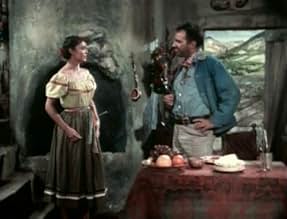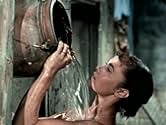Agrega una trama en tu idiomaIn Mexico, at the dawn of the automobile, modern bandit Santiago burglarizes train freight cars and falls in love with a poor farmer's wife.In Mexico, at the dawn of the automobile, modern bandit Santiago burglarizes train freight cars and falls in love with a poor farmer's wife.In Mexico, at the dawn of the automobile, modern bandit Santiago burglarizes train freight cars and falls in love with a poor farmer's wife.
- Premios
- 1 nominación en total
Eumenio Blanco
- Bartender
- (sin créditos)
Edward Colmans
- Police Officer
- (sin créditos)
Bert LeBaron
- Brawler
- (sin créditos)
Jose Portugal
- Hood
- (sin créditos)
Armando Rodriguez
- Bar Patron
- (sin créditos)
Rosa Turich
- Vendor
- (sin créditos)
- Dirección
- Guionista
- Todo el elenco y el equipo
- Producción, taquilla y más en IMDbPro
Opiniones destacadas
The movie's not a western in the usual sense. Instead, it's more like a pondering of character and life-styles set in modern Mexico. Manuel and Maria are in an arranged marriage, she being passed along like a piece of property, he being a budding farm entrepreneur. They are above all "respectable", and the feeling is that this is what holds the marriage together.
Then, into their settled life arrives escaping train robber Santiago. But he's not a typical robber. We know that from his buddy's moving death scene. There Santiago shows something of a poetic sensitivity, proving he's not without his own sense of values. In fact, he's more a free spirit than a criminal type, even giving away much of his loot to deserving strangers. Ironically, however, he appears unfree to be anything but free!
It's Santiago's free-wheeling effect on the young couple's brittle marriage that makes up the storyline. Kennedy, of course, was one of that era's premier actors. Here, his bravura performance effectively dramatizes Santiago's free spirit gusto. On the other hand, as the young couple, Iglesias and St. John appear over-the-top at times. Perhaps that can be rationalized by their emotional release from repressed lives. Nevertheless, the emoting does at times distract from story advancement.
The notion of respectability is also pondered here. What the screenplay seems to be saying is that conforming lives are okay as long as one's humanity is not sacrificed in the process. In his own eccentric way, this appears the lesson Santiago imparts to the young couple. At the same time, religion gets much the same treatment, while criminal Santiago acts poetically as a kind of secular priest in easing his dying confederate into the great unknown.
All in all, the movie's distinctive features come more from blacklisted writer Zimet's offbeat screenplay than from cult director Ulmer who's required to film in Technicolor instead of his b&w forte. Nonetheless, the movie's fully deserving of the Ulmer brand-- an offbeat 80-minutes that manages some depth over and above its tacky 50's title.
Then, into their settled life arrives escaping train robber Santiago. But he's not a typical robber. We know that from his buddy's moving death scene. There Santiago shows something of a poetic sensitivity, proving he's not without his own sense of values. In fact, he's more a free spirit than a criminal type, even giving away much of his loot to deserving strangers. Ironically, however, he appears unfree to be anything but free!
It's Santiago's free-wheeling effect on the young couple's brittle marriage that makes up the storyline. Kennedy, of course, was one of that era's premier actors. Here, his bravura performance effectively dramatizes Santiago's free spirit gusto. On the other hand, as the young couple, Iglesias and St. John appear over-the-top at times. Perhaps that can be rationalized by their emotional release from repressed lives. Nevertheless, the emoting does at times distract from story advancement.
The notion of respectability is also pondered here. What the screenplay seems to be saying is that conforming lives are okay as long as one's humanity is not sacrificed in the process. In his own eccentric way, this appears the lesson Santiago imparts to the young couple. At the same time, religion gets much the same treatment, while criminal Santiago acts poetically as a kind of secular priest in easing his dying confederate into the great unknown.
All in all, the movie's distinctive features come more from blacklisted writer Zimet's offbeat screenplay than from cult director Ulmer who's required to film in Technicolor instead of his b&w forte. Nonetheless, the movie's fully deserving of the Ulmer brand-- an offbeat 80-minutes that manages some depth over and above its tacky 50's title.
King of the cheapies Edgar Ullmer directed this modern west saga set in Mexico with something he normally didn't have at his disposal, technicolor. Even with that it's certainly one parsimonious production, but not bad.
Although why he cast Arthur Kennedy replete with dyed black hair and a greasy beard as a Mexican bandit who knows. This was a role so right for Gilbert Roland. I guess he wasn't available.
Nevertheless Kennedy gives it his best as the charismatic bandit who after losing one partner doing a job is ready for another. He takes refuge in the house of farmer Eugene Iglesias and wife Betta St.John. In one way or another he seduces both of them with what they see as a romantic life style. Both want to go off with him and leave the other.
The Naked Dawn is a curious little film, deep in character rather than plot. But I think it would have been a classic with a Gilbert Roland or a Fernando Lamas in the lead.
Although why he cast Arthur Kennedy replete with dyed black hair and a greasy beard as a Mexican bandit who knows. This was a role so right for Gilbert Roland. I guess he wasn't available.
Nevertheless Kennedy gives it his best as the charismatic bandit who after losing one partner doing a job is ready for another. He takes refuge in the house of farmer Eugene Iglesias and wife Betta St.John. In one way or another he seduces both of them with what they see as a romantic life style. Both want to go off with him and leave the other.
The Naked Dawn is a curious little film, deep in character rather than plot. But I think it would have been a classic with a Gilbert Roland or a Fernando Lamas in the lead.
There is something very likable about this low budget, "poetic" story of an aging outlaw who comes upon the small farm of an ambitious peon and his willful wife. The atmosphere is a bit thick perhaps, constant philosophizing in a "poetic" Spanish accent, with a guitar playing in the background. But Kennedy is particularly good as the outlaw, worldly-wise and mellow with flashes of toughness, anger and cynicism. The other players carry their weight well enough, though Iglesias sometimes goes a bit overboard with his characterization of the naive, greedy young man. There's not much to the story, but it's well told. Here, certainly, is a film that, whatever its ultimate virtues, is unique. Though the subject makes it a Western, the style (as well as the Mexican setting and the apparent thirties time-frame) makes it something completely different. This is the sort of film one expects from Ulmer's reputation; small but personal. I really did like it, but I don't know if I would go as far as Francois Truffaut: "Poetic and violent, tender and droll, moving and subtle, joyously energetic and wholesome... reminds us inevitably of Renoir and Ophuls."
A compelling movie of a different kind. When a low budget movie that was filmed in 10 days with very few characters, markedly rivets ones attention, that is a telltale sign of a a good and unusual production. The attire and settings were very convincing. The three leading characters all portrayed Hispanics extremely unusual for a 1950s western. The acting/directing was very good. The movie discusses female servitude/abuse; and the lure of money and its impact on ones loyalty, profession, and romantic decisions. With few characters and a low budget, the movie project took the very little and turned into quite an interesting and believable flick, of a different kind, that found time to examine core aspects of human behavior. In the same general genre as For Whom the Bell Tolls, but yet so different. Wow!!
A low budget gives this western its strength : almost all the action takes place in Manuel's seedy farm and do not expect an action-packed yarn ;it's almost a crepuscular western for the automobiles appear .In its own special way ,it's also a parable desguised as western .
The great character actor Arthur Kennedy rarely got top billing ,and considering his talent,it was totally unfair.Made up as a Mexican ,with a fake accent , you hardly know him;his character is colorful: before his pal dies , he imposes an interminable religious solace upon him , justifying their dirty deeds by the Holy Scripts.
However, Santiago may embody the Devil ,coming to tempt a couple of innocent peasants ,resigned to their modest fate; when one meets him, Manuel hopes for a better future ,but through his hard work ;the lure of gain appears later when he accompanies his new friend who calls on his boss to recover his wage ;in parallel, the wife is sexually attracted by the bandit and his depiction of an idealized Vera Cruz makes her dream of a storylike life,far from the lousy life she leads with a rather indolent hubby :when one meets her by the river ,she 's daydreaming ,humming a melody , perhaps waiting for something which never happens ...Relatively speaking ,religion plays an almost Bunuelesque role.
By and large , the intimate scenes are much more successful than the (rare ) eventful moments: the hanging of the boss, the rumble,the final settlement of scores .
The great character actor Arthur Kennedy rarely got top billing ,and considering his talent,it was totally unfair.Made up as a Mexican ,with a fake accent , you hardly know him;his character is colorful: before his pal dies , he imposes an interminable religious solace upon him , justifying their dirty deeds by the Holy Scripts.
However, Santiago may embody the Devil ,coming to tempt a couple of innocent peasants ,resigned to their modest fate; when one meets him, Manuel hopes for a better future ,but through his hard work ;the lure of gain appears later when he accompanies his new friend who calls on his boss to recover his wage ;in parallel, the wife is sexually attracted by the bandit and his depiction of an idealized Vera Cruz makes her dream of a storylike life,far from the lousy life she leads with a rather indolent hubby :when one meets her by the river ,she 's daydreaming ,humming a melody , perhaps waiting for something which never happens ...Relatively speaking ,religion plays an almost Bunuelesque role.
By and large , the intimate scenes are much more successful than the (rare ) eventful moments: the hanging of the boss, the rumble,the final settlement of scores .
¿Sabías que…?
- TriviaFrançois Truffaut cited this film as an inspiration for Jules and Jim. In fact, he even mentions Jules and Jim in his review of this film. Truffaut's film came out six years later.
- ConexionesFeatured in Edgar G. Ulmer: The Man Off-Screen (2004)
Selecciones populares
Inicia sesión para calificar y agrega a la lista de videos para obtener recomendaciones personalizadas
Detalles
- Tiempo de ejecución1 hora 22 minutos
Contribuir a esta página
Sugiere una edición o agrega el contenido que falta




























